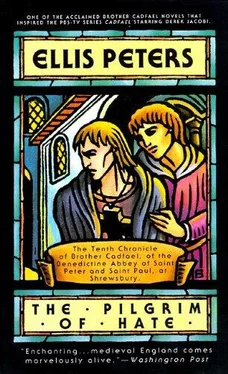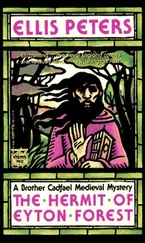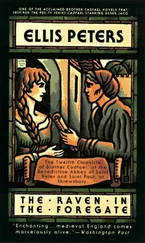Ellis Peters - The Pilgrim of Hate
Здесь есть возможность читать онлайн «Ellis Peters - The Pilgrim of Hate» весь текст электронной книги совершенно бесплатно (целиком полную версию без сокращений). В некоторых случаях можно слушать аудио, скачать через торрент в формате fb2 и присутствует краткое содержание. Жанр: Исторический детектив, на английском языке. Описание произведения, (предисловие) а так же отзывы посетителей доступны на портале библиотеки ЛибКат.
- Название:The Pilgrim of Hate
- Автор:
- Жанр:
- Год:неизвестен
- ISBN:нет данных
- Рейтинг книги:4 / 5. Голосов: 1
-
Избранное:Добавить в избранное
- Отзывы:
-
Ваша оценка:
- 80
- 1
- 2
- 3
- 4
- 5
The Pilgrim of Hate: краткое содержание, описание и аннотация
Предлагаем к чтению аннотацию, описание, краткое содержание или предисловие (зависит от того, что написал сам автор книги «The Pilgrim of Hate»). Если вы не нашли необходимую информацию о книге — напишите в комментариях, мы постараемся отыскать её.
The Pilgrim of Hate — читать онлайн бесплатно полную книгу (весь текст) целиком
Ниже представлен текст книги, разбитый по страницам. Система сохранения места последней прочитанной страницы, позволяет с удобством читать онлайн бесплатно книгу «The Pilgrim of Hate», без необходимости каждый раз заново искать на чём Вы остановились. Поставьте закладку, и сможете в любой момент перейти на страницу, на которой закончили чтение.
Интервал:
Закладка:
“It is not much to go on,” said Abbot Radulfus with a smile, “but certainly you may enquire. If he has done no wrong, I should be glad to help you to find him and bring him off without reproach. What is his name?”
“Luc Meverel. Twenty-four years old, they tell me, middling tall and well made, dark of hair and eye.”
“It could fit many hundreds of young men,” said the abbot, shaking his head, “and the name I doubt he will have put off if he has anything to hide, or even if he fears it may be unfairly besmirched. Yet try. I grant you in such a gathering as we have here now a young man who wished to be lost might bury himself very thoroughly. Denis will know which of his guests is of the right age and quality. For clearly your Luc Meverel is well-born, and most likely tutored and lettered.”
“Certainly so,” said Olivier.
“Then by all means, and with my blessing, go freely to Brother Denis, and see what he can do to help you. He has an excellent memory, he will be able to tell you which, among the men here, is of suitable years, and gentle. You can but try.”
On leaving the lodging they went first, however, to look for Brother Cadfael. And Brother Cadfael was not so easily found. Hugh’s first resort was the workshop in the herbarium, where they habitually compounded their affairs. But there was no Cadfael there. Nor was he with Brother Anselm in the cloister, where he well might have been debating some nice point in the evening’s music. Nor checking the medicine cupboard in the infirmary, which must surely have been depleted during these last few days, but had clearly been restocked in the early hours of this day of glory. Brother Edmund said mildly: “He was here. I had a poor soul who bled from the mouth, too gorged, I think, with devotion. But he’s quiet and sleeping now, the flux has stopped. Cadfael went away some while since.”
Brother Oswin, vigorously fighting weeds in the kitchen garden, had not seen his superior since dinner. “But I think,” he said, blinking thoughtfully into the sun in the zenith, “he may be in the church.”
Cadfael was on his knees at the foot of Saint Winifred’s three-tread stairway to grace, his hands not lifted in prayer but folded in the lap of his habit, his eyes not closed in entreaty but wide open to absolution. He had been kneeling there for some time, he who was usually only too glad to rise from knees now perceptibly stiffening. He felt no pains, no griefs of any kind, nothing but an immense thankfulness in which he floated like a fish in an ocean. An ocean as pure and blue and drowningly deep and clear as that well-remembered eastern sea, the furthest extreme of the tideless midland sea of legend, at the end of which lay the holy city of Jerusalem, Our Lord’s burial-place and hard-won kingdom. The saint who presided here, whether she lay here or no, had launched him into a shining infinity of hope. Her mercies might be whimsical, they were certainly magisterial. She had reached her hand to an innocent, well deserving her kindness. What had she intended towards this less innocent but no less needy being?
Behind him, approaching quietly from the nave, a known voice said softly: “And are you demanding yet a second miracle?”
He withdrew his eyes reluctantly from the reflected gleams of silver along the reliquary, and turned to look towards the parish altar. He saw the expected shape of Hugh Beringar, the thin dark face smiling at him. But over Hugh’s shoulder he saw a taller head and shoulders loom, emerging from dimness in suave, resplendent planes, the bright, jutting cheekbones, the olive cheeks smoothly hollowed below, the falcon’s amber eyes beneath high-arched black brows, the long, supple lips tentatively smiling upon him.
It was not possible. Yet he beheld it. Olivier de Bretagne came out of the shadows and stepped unmistakable into the light of the altar candles. And that was the moment when Saint Winifred turned her head, looked fully into the face of her fallible but faithful servant, and also smiled.
A second miracle! Why not? When she gave she gave prodigally, with both hands.
Chapter Eleven
THEY WENT OUT into the cloister all three together, and that in itself was memorable and good, for they had never been together before. Those trusting intimacies which had once passed between Cadfael and Olivier, on a winter night in Bromfield priory, were unknown still to Hugh, and there was a mysterious constraint still that prevented Olivier from openly recalling them. The greetings they exchanged were warm but brief, only the reticence behind them was eloquent, and no doubt Hugh understood that well enough, and was willing to wait for enlightenment, or courteously to make do without it. For that there was no haste, but for Luc Meverel there might be.
“Our friend has a quest,” said Hugh, “in which we mean to enlist Brother Denis’s help, but we shall also be very glad of yours. He is looking for a young man by the name of Luc Meverel, strayed from his place and known to be travelling north. Tell him the way of it, Olivier.”
Olivier told the story over again, and was listened to with close attention. “Very gladly,” said Cadfael then, “would I do whatever man can do not only to bring off an innocent man from such a charge, but also to bring the charge home to the guilty. We know of this murder, and it sticks in every gullet that a decent man, protecting his honourable opponent, should be cut down by one of his own faction…”
“Is that certain?” wondered Hugh sharply.
“As good as certain. Who else would so take exception to the man standing up for his lady and doing his errand without fear? All who still held to Stephen in their hearts would approve, even if they dared not applaud him. And as for a chance attack by sneak-thieves, why choose to prey on a mere clerk, with nothing of value on him but the simple needs of his journey, when the town was full of nobles, clerics and merchants far better worth robbing? Rainald died only because he came to the clerk’s aid. No, an adherent of the empress, like Rainald himself but most unlike, committed that infamy.”
“That’s good sense,” agreed Olivier. “But my chief concern now is to find Luc, and send him home again if I can.”
“There must be twenty or more young fellows in that age here today,” said Cadfael, scrubbing thoughtfully at his blunt brown nose, “but I dare wager most of them can be pricked out of the list as well known to some of their companions by their own right names, or by reason of their calling or condition. Solitaries may come, but they’re few and far between. Pilgrims are like starlings, they thrive on company. We’d best go and talk to Brother Denis. He’ll have sorted out most of them by now.”
Brother Denis had a retentive memory and an appetite for news and rumours that usually kept him the best-informed person in the enclave. The fuller his halls, the more pleasure he took in knowing everything that went on there, and the name and vocation of every guest. He also kept meticulous books to record the visitations.
They found him in the narrow cell where he kept his accounts and estimated his future needs, thoughtfully reckoning up what provisions he still had, and how rapidly the demands on them were likely to dwindle from the morrow. He took his mind from his store-book courteously in order to listen to what Brother Cadfael and the sheriff required of him, and produced answers with exemplary promptitude when asked to sieve out from his swollen household males of about twenty-five years, bred gentle or within modest reach of gentility, lettered, of dark colouring and medium tall build, answering to the very bare description of Luc Meverel. As his forefinger flew down the roster of his guests the numbers shrank remarkably. It seemed to be true that considerably more than half of those who went on pilgrimage were women, and that among the men the greater part were in their forties or fifties, and of those remaining, many would be in minor orders, either monastics or secular priests or would-be priests. And Luc Meverel was none of these.
Читать дальшеИнтервал:
Закладка:
Похожие книги на «The Pilgrim of Hate»
Представляем Вашему вниманию похожие книги на «The Pilgrim of Hate» списком для выбора. Мы отобрали схожую по названию и смыслу литературу в надежде предоставить читателям больше вариантов отыскать новые, интересные, ещё непрочитанные произведения.
Обсуждение, отзывы о книге «The Pilgrim of Hate» и просто собственные мнения читателей. Оставьте ваши комментарии, напишите, что Вы думаете о произведении, его смысле или главных героях. Укажите что конкретно понравилось, а что нет, и почему Вы так считаете.












